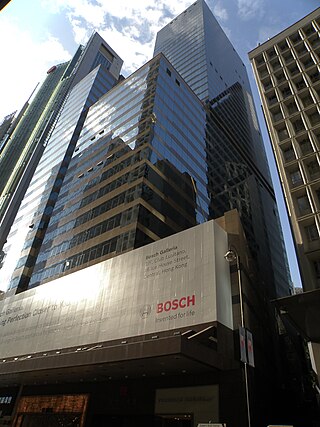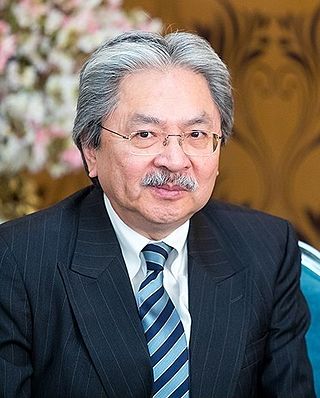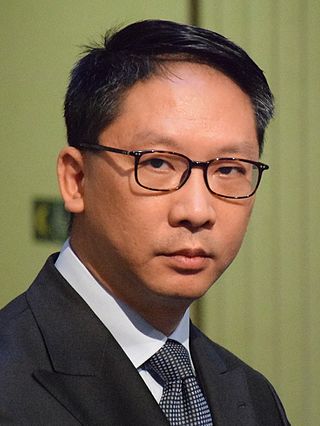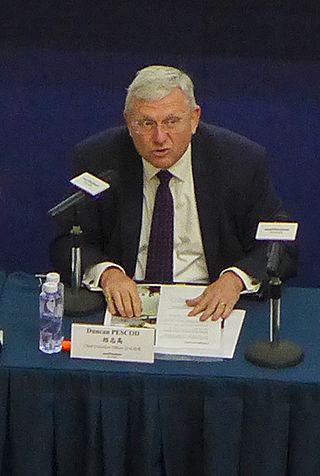Related Research Articles

The politics of Hong Kong takes place in a framework of a political system dominated by its quasi-constitutional document, the Hong Kong Basic Law, its own legislature, the Chief Executive as the head of government and of the Special Administrative Region and of a politically constrained multi-party presidential system. The Government of the Hong Kong Special Administrative Region of the People's Republic of China is led by the Chief Executive, the head of government.

The Government of the Hong Kong Special Administrative Region, commonly known as the Hong Kong Government or HKSAR Government, is the executive authorities of Hong Kong. It was formed on 1 July 1997 in accordance with the Sino-British Joint Declaration of 1983, an international treaty lodged at the United Nations. This government replaced the former British Hong Kong Government (1842–1997). The Chief Executive and the principal officials are appointed by the State Council of the People's Republic of China. The Government Secretariat is headed by the Chief Secretary of Hong Kong, who is the most senior principal official of the Government. The Chief Secretary and the other secretaries jointly oversee the administration of Hong Kong, give advice to the Chief Executive as members of the Executive Council, and are accountable for their actions and policies to the Chief Executive and the Legislative Council.

The Liberal Party (LP) is a pro-Beijing, pro-business, and conservative political party in Hong Kong. Led by Tommy Cheung and chaired by Peter Shiu, it holds four seats in the Legislative Council, and holds five seats in the District Councils.

Sir Donald Tsang Yam-kuen is a former Hong Kong civil servant who served as the second Chief Executive of Hong Kong from 2005 to 2012.

New World Development Company Limited (NWD), is a Hong Kong-based company focused on property, hotels, infrastructure and services and department stores. It was established on 29 May 1970 by Cheng Yu-tung. The company is publicly listed on the Stock Exchange of Hong Kong Limited since 23 November 1972 and is a constituent stock of Hong Kong Hang Seng Index.

Michael "Mike" John Treloar Rowse is a Hong Kong public figure. A naturalised citizen of the People's Republic of China, Rowse was the Director-General of InvestHK, a department of the Hong Kong Government.

Principal Officials Accountability System, commonly referred to as the Ministerial system, sometimes the Accountability System, was introduced in Hong Kong by chief executive Tung Chee Hwa in July 2002. It is a system whereby all principal officials, including the Chief Secretary, Financial Secretary, Secretary for Justice and head of government bureaux would no longer be politically neutral career civil servants. Instead, they would all be political appointees chosen by the chief executive.

John Tsang Chun-wah, GBM, JP is a Hong Kong former senior civil servant and government official who was the longest-serving Financial Secretary of Hong Kong SAR to date, from 2007 to 2017.

Denise Yue Chung-yee GBS JP was a Hong Kong politician and Secretary for the Civil Service.

Rimsky Yuen Kwok-keung is a barrister who served as the third Secretary for Justice of Hong Kong from 2012 to 2018.

The Political Appointments System is a scheme introduced in 2008 by the Hong Kong Government to reinforce its ministerial team by superseding the Principal Officials Accountability System and inserting two layers of politically appointed officials below the secretaries, who are political appointees. These appointees report only to the secretaries, but not the permanent secretaries, the highest-ranking civil servants. The appointment of undersecretaries and political assistants is an extension of the previous RPAS that was initially confined to principal officials. Prior to the introduction, there were 14 political appointees—3 Secretaries of Departments and 11 Directors of Bureaux.
Leung Chin-man JP is a retired senior civil servant in the Government of Hong Kong the former Permanent Secretary for Housing, Planning and Lands.
Mr Justice Pang Kin-kee, SBS is a former Judge of the Court of First Instance of the High Court in Hong Kong.

The Second term of Donald Tsang as Chief Executive of Hong Kong, officially referred to as "The 3rd term Chief Executive of Hong Kong" relates to the period of governance of Hong Kong since the transfer of sovereignty over Hong Kong, between 1 July 2007 and 30 June 2012. Former civil-servant Donald Tsang was the Chief Executive throughout the duration.
The 2010 Hong Kong electoral reform was the series of events began in 2009 and finalised in 2010 under the Consultation Document on the Methods for Selecting the Chief Executive and for Forming the Legislative Council in 2012, a document published on 18 November 2009 by the Government of Hong Kong to broaden the scope of political participation and increase the democratic elements in the 2012 elections in line with the Hong Kong Basic Law.

The administration of Leung Chun-ying as Chief Executive of Hong Kong, officially referred to as "The 4th term Chief Executive of Hong Kong" relates to the period of governance of Hong Kong since the transfer of sovereignty over Hong Kong, between 1 July 2012 and 30 June 2017.

The 2017 Hong Kong Chief Executive election was held on 26 March 2017 for the 5th term of the Chief Executive of Hong Kong (CE), the highest office of the Hong Kong Special Administrative Region (HKSAR). Former Chief Secretary for Administration Carrie Lam beat former Financial Secretary John Tsang and retired judge Woo Kwok-hing, receiving 777 votes from the 1,194-member Election Committee.
The Wang Chau housing controversy comprises a series of events related to a housing project in Wang Chau, Yuen Long District, Hong Kong. Initiated in 2012, the housing project aims to develop 17,000 public housing units in three phases. Phase 1 refers to ongoing development of 4,000 units in a "green-belt" site; while phases 2 and 3 refer to the deferred plan to build the rest of the targeted units in the "brownfield" site. The case came under media scrutiny after activist Eddie Chu Hoi-dick raised concerns about potential collusion between the Hong Kong government, businesses and rural landlords in his election campaign.
Michael Sze Cho-cheung, GBS, CBE, ISO, JP was a Hong Kong government official. He held various government positions including Secretary for Constitutional Affairs from 1991 to 1994 and Secretary for the Civil Service from 1994 to 1996. He was executive director of the Trade Development Council (DTC) from 1996 to 2004 and chairman of the Operations Review Committee of the Independent Commission Against Corruption (ICAC) until 2014.

Duncan Warren Pescod is the former director of the West Kowloon Cultural District Authority, a statutory body of the Hong Kong Government.
References
- 1 2 3 4 5 Daniel Sin (9 August 2008). "Tsang's civil unrest". South China Morning Post. pp. A14.
- 1 2 Diana Lee (5 August 2008). "Former housing chief faces legal bid to demolish his job with developer". The Standard. Archived from the original on 11 December 2008. Retrieved 7 August 2008.
- ↑ "Audit chief backs lawmakers in Promenade row". The Standard. Hong Kong. 17 May 2006. Archived from the original on 22 May 2011. Retrieved 23 March 2007.
- 1 2 Albert Wong (25 May 2006). "Audit chief in deal on judicial review". The Standard. Hong Kong. Archived from the original on 22 May 2011. Retrieved 23 March 2007.
- 1 2 "Discussion paper: Policy governing the acceptance of post-retirement employment of civil servants" (PDF) (LC Paper No. CB(1)1786/03–04(03)). Legislative Council, Hong Kong.
{{cite journal}}: Cite journal requires|journal=(help) - ↑ "Post-service Outside Work". CIvil Service Bureau, Government of Hong Kong.
{{cite journal}}: Cite journal requires|journal=(help) - 1 2 3 4 5 "Report on the processing of the application from Mr Leung Chin-man to take up post-service outside work with New World China Land Limited" (PDF). Civil Service Bureau, Govt of Hong Kong. 15 August 2008. Retrieved 18 August 2008.
{{cite journal}}: Cite journal requires|journal=(help) - ↑ op-ed: Albert Cheng (9 August 2008). "Legal, but is it right?". South China Morning Post. pp. A13.
- ↑ Nickkita Lau (8 August 2008). "Spat over Leung retirement job prompts review". The Standard. Archived from the original on 22 May 2011.
- ↑ "北京發功逼退梁展文". Apple Daily. Hong Kong. 13 August 2008. Archived from the original on 15 August 2008. Retrieved 14 August 2008.
- ↑ "Hiring snub to civil servants". The Standard. 14 August 2008. Archived from the original on 22 May 2011. Retrieved 14 August 2008.
- ↑ Fanny Fung (14 August 2008). "Conflicts could harm city's stability, Beijing official warns". South China Morning Post.
- ↑ Secretary for the Civil Service (15 August 2008). "SCS submits report to Chief Executive on Leung Chin-man's case" (Press release). Civil Service Bureau, Hong Kong Government.
- ↑ Gary Cheung (16 August 2008). "Officials didn't see decision causing a row". South China Morning Post. pp. A10.
- ↑ Chief Executive of Hong Kong (15 August 2008). "Statement of the Chief Executive's Office" (Press release). Chief Executive's Office, Hong Kong Government.
- 1 2 Cheung Chi-fai (16 August 2008). "Ex-housing chief shocked officials didn't consider Hung Hom deal". South China Morning Post. pp. A10.
- 1 2 Chris Yeung (17 August 2008). "Despite rethink, episode has done damage". South China Morning Post. pp. op–ed.
- ↑ "job row show glaring lack of political sense". South China Morning Post. 16 August 2008. pp. A14.
- ↑ op-ed: Albert Cheng (16 August 2008). "To serve and collect". South China Morning Post. pp. A13.
- ↑ Ambrose Leung & Gary Cheung (16 August 2008). "Critics of ex-official's job approval focus on system, not the minister". South China Morning Post. pp. A10.
- ↑ Eva Wu (17 August 2008). "Tsang orders sweeping review after job storm". South China Morning Post. pp. A6.
- ↑ Christopher Cheung (21 August 2008). "No way to govern". South China Morning Post. pp. A15.